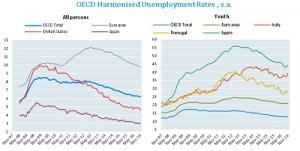Finance & Economics
Re-orienting Tax Incentives Could Boost Growth, Jobs and Support Poverty Alleviation
Re-orienting investment tax incentives towards sectors of the South Africa economy that have high productivity and a comparative advantage would stimulate growth, create additional jobs and support poverty alleviation, according to a World Bank report released on January 17.
- Read more
- 267 reads
New Yemen Projects to Help 9 Million People with Basic Health and Nutrition Services and Work Opportunities
The World Bank Group on January 17 announced two new grants for Yemen totaling US$450 million to provide emergency support for the most vulnerable segment of the population in all of the country’s 22 governorates. The new grants from IDA, the Bank’s fund for the poorest countries, will finance two nationwide projects aimed at providing vulnerable women and children with access to critical health and nutrition services, income opportunities for the poorest households, and the essential social services that millions of Yemenis rely on.
- Read more
- 241 reads
Sri Lanka Signs US$125 Million Credit to Modernize Agriculture
Sri Lanka has signed a US$125 million credit with the World Bank to help the country modernize its agriculture sector. Sri Lanka aims to make the sector more efficient and attractive as a modern business, more responsive to consumer demand, and more environmentally sustainable and resilient to climate change.
- Read more
- 246 reads
World Bank: Improved effectiveness of spending in Indonesia can boost growth in 2017
Indonesia’s reforms to fiscal policy and the investment climate are expected to boost the economy—projected to grow at 5.3 percent in 2017—according to a new World Bank report released on January 17.
- Read more
- 295 reads
Reforms Needed to Rebalance Finance in the Western Balkans, Says New World Bank Report
Policymakers in the Western Balkans should rebalance their financial sectors to encourage long-term growth in the region, says a new World Bank report. According to Risks and Returns: Managing Financial Trade-Offs for Inclusive Growth in Europe and Central Asia, on January 16, presented at an event in Vienna, an over reliance on bank credit has contributed to underdeveloped capital markets and a high number of nonperforming loans across the region.
- Read more
- 295 reads
IMF Executive Board Concludes 2016 Article IV Consultation with the Republic of Estonia
On January 9, 2017, the Executive Board of the International Monetary Fund (IMF) concluded the Article IV consultation with the Republic of Estonia.
- Read more
- 308 reads
U.S.- EU Negotiations for a Bilateral Agreement on Insurance and Reinsurance Measures
“U.S. and EU representatives are pleased to announce the conclusion of successful negotiations on an agreement that will ensure ongoing robust insurance consumer protection and provide enhanced regulatory certainty for insurers and reinsurers operating in both the U.S. and the EU. These negotiations resulted in a written Agreement that is a ‘covered agreement’ in the meaning of the Dodd-Frank Act for the United States and an Agreement under Article 218 of the Treaty on the Functioning of the European Union for the EU.
- Read more
- 356 reads
Swaziland to Scale-up its Capacity to Improve Service Delivery
The Government of Swaziland’s efforts to improve its public sector performance on January 12 got a boost following the approval of $25 million by the World Bank Group Board of Executive Directors. The financing will help Swaziland strengthen its institutions and improve the performance of key ministries which provide critical services to the public.
- Read more
- 305 reads
IMF Executive Board Approves New Two-Year €8.24 Billion Flexible Credit Line Arrangement for Poland
The Executive Board of the International Monetary Fund (IMF) on January 13 approved a successor two-year arrangement for Poland under the Flexible Credit Line (FCL) with reduced access in an amount equivalent to SDR 6.5 billion (about €8.24 billion, or 159 percent of quota). The Polish authorities intend to treat the arrangement as precautionary and do not intend to draw on the FCL.
- Read more
- 312 reads
Human Rights
Fostering a More Humane World: The 28th Eurasian Economic Summi

Conscience, Hope, and Action: Keys to Global Peace and Sustainability

Ringing FOWPAL’s Peace Bell for the World:Nobel Peace Prize Laureates’ Visions and Actions

Protecting the World’s Cultural Diversity for a Sustainable Future

Puppet Show I International Friendship Day 2020


